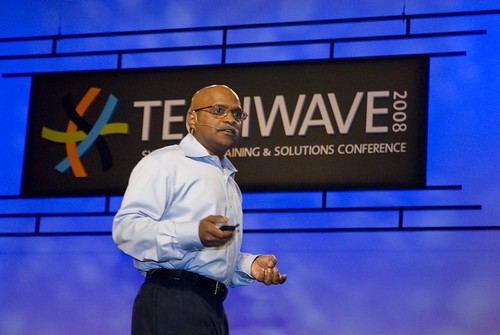No single IT vendor is “unique”

Don’t you just hate that when IT vendors try and tell you that they have a ‘unique’ technology proposition? My first editorial tuition came from a chap called Andy Drew and he drilled it into me that we NEVER use that term journalistically.
Having just spent a week with Sybase at its TechWave 2008 conference, I’ve been more than just a little close to all the acronyms, adjectives and exaggerations that the corporate PR machine typically conjures up. Given this proximity, I’m not prepared to actually use the “U”-word; but I would go so far as to say that what makes Sybase “interesting” is that it exists in the mid ground between the database monsters and the so-called ‘small footprint’ database companies.
What probably makes it more interesting (but not quite unique) is that it has a particular focus on the mobile market. Specifically, this is technology to support corporate database synchronisation with mobile devices.
I had a one-to-one meeting with senior VP Dr Raj Nathan who spoke to me about how mobile analytics will be an increasingly crucial part of the way efficient database structures operate. Sybase says it is exclusively focused on managing and mobilising information and that analytics products will now come to the fore as overburdened data warehouses need these extra tools to support the burgeoning use of devices in industry and by consumers.
 '
Dr Raj: Man in motion
'
Dr Raj: Man in motion
Eluding to the emerging middle classes in India, China and to a lesser extent Africa that are now able to get their hands on mobile devices; Nathan said that bringing these users online is only possible if we are able to perform extra analytics at the back end – and I find that hard to argue with.
He also had an “interesting” (there’s that word again) opinion on the way companies evolve with their newly empowered unwired workers based around the concept that managers need information to make decisions. The more information they have, the less they will have to rely on instinct – and the better their judgment ought to be.
Nathan told me, “Inside the enterprise this information accessibility is more predictable. PCs can be physically updated and upgraded, servers can be accessed and information manageability is at a maximum. It's easier to get all the children to the dinner table when they still live at home. But in the unwired enterprise this accessibility breaks down.”
Where Sybase’s take on the mobile database world really moved into fifth gear was when the company acquired mobile messaging and content delivery company Mobile 365 back in 2006. Since then, with the formation of Sybase 365, the company has seen increasing revenues from SMS and MMS as it sits “between” networks to move traffic from A to B.
I spent some time with Sybase 365 president Marty Beard, who pointed me to Gartner stats that claim, "...by 2010, 50% of enterprises will have migrated away from tactical mobile application silos (supporting a single application) to strategic platforms capable of supporting multiple applications, managing devices and securing data and transport."
Beard went on to tell me that with the increasing interest in mobile commerce, flight information etc. the focus now should not be just on the device and its functionality, nor even on the application development behind the software that the user interacts with – but that we need to also have more awareness of the network that the data has to be carried over and the way it is accessed, managed and delivered.
To get an external opinion on the way Sybase positions its products and the type of support it typically serves up alongside I spoke to Chris Pollach, a seasoned programmer from Ontario Canada. Modestly describing himself as the ‘Great White North Evangelist’ Chris told me the following:
“The Canadian Federal government in our capital city of Ottawa has a plethora of mission critical systems utilising various Sybase technologies. From issuing passports, managing federal elections, scheduling cases at the Supreme Court, tracing 911 police emergency calls, issuing firearm licenses, monitoring city utilities, etc - each of these systems use a Sybase technology that works in concert with other technology vendors’ products. I think that this exemplifies on how Sybase technologies integrate well with other vendor products to help deliver a comprehensive business solution.”
So, in summary, Sybase is an “unusual” database company if not a unique one. The customers I spoke to seem to still be pleased with the functionality they get from the company’s PowerBuilder, PowerDesigner and Sybase IQ products. A good report on this type of feedback can be found here, as detailed by my colleague and friend David Norfolk from Bloor Research who I spent time with at the event.
The company’s CEO and president John Chen repeatedly voices a ‘bet on us now and you might just find that we really can pull this technology proposition off' - kind of message. Although he does only seem to do this when he knows there are plenty of financial analysts around.
So in all it was a good event, certainly interesting and thought provoking – if not quite unique. So the highlight for me? Hmm, let me think… Day one keynote maybe? Lunch with John Chen? Breakout one-to-ones with all the senior management do you reckon? Presentations by tech marketing guru Geoffrey Moore?
Nah – none of those.
My musical hero Chris Cornell played the House of Blues in Vegas last Wednesday night and I was there rocked out and knocked out without an application development for database thought in my head!